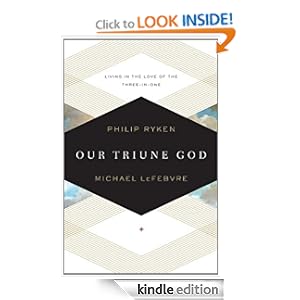 I am way behind in my 2012 reading goals. I am reading about the Trinity this year. I started out with this book to read with some friends in a little informal email reading group. Because we all graduated from Wheaton College and Ryken is the current president of Wheaton we though we would read this book together.
I am way behind in my 2012 reading goals. I am reading about the Trinity this year. I started out with this book to read with some friends in a little informal email reading group. Because we all graduated from Wheaton College and Ryken is the current president of Wheaton we though we would read this book together.
After 3 months we are only half way through (and probably won’t really finish).
This not a bad book, but there are several theological and editorial decisions that I disagree with and make it so that I would recommend this only as a supplemental book on the Trinity. On the good side, it is only $1.99 for Kindle.
But the negative side has a lot longer list. First, there was a decision noted in the introduction that this book is concentrated on the Trinity in relation to the individual, not the community of faith. This makes very little sense to me because most of the work of the last century or two on the Trinity has related to its social importance, especially to the community of faith. So I was a bit put off by that orientation.
What really put me off is the first chapter. While it is primarily an exposition of Ephesians, it seems to turn the doctrine of the Trinity into a discussion of individual salvation. My basic issue is that in the first chapter he talks about the Trinity almost entirely through the eyes of humans. “God is who he is in his triune being for our salvation”. I am pretty sure he doesn’t mean this, but it sounds like he is saying that apart from our salvation the Trinity would not be a Trinity, which would seem to violate a lot of orthodox theological understanding. The authors also misuse (as it is very commonly misused) Rev 22:17 (the I stand at the door knocking passage.) The passage is clearly speaking to the church in context, not un-Christians.
The second chapter is much better. The authors talk about the mystery of the Trinity and that all we can really do is talk about it through metaphors. Metaphors are always limited. Metaphors talk about something through analogy with something else. But the something else is never the actual thing we are talking about. Metaphors always break down. I think this, as far as it gets is very helpful. I think we can move past metaphors, but I appreciate the authors concern with metaphors.
The book proceeds to then try to trace the Trinity through the Old Testament and New Testament. I think that what ends up happening is a good example of reading scripture through theology, more than actually reading the text. The OT may have hints at the Trinity, but it is not overtly trinitarian. And several examples of the authors attempts at illustrating monotheism seem to fall equally flat. Two examples: 1) The 10 commandments. The phrase ‘you shall have no other Gods before me’ seems to start with the understanding that there are other Gods. But the authors understand it as the complete opposite. 2) The Shema (Hear, Israel, the Lord is our God, the Lord is One) also is a statement of faith against the common understanding around Israel that there were multiple Gods. Israel clearly believed their God was the supreme God, the creator and the King of Kings. But the Torah and other early Israel theological statements are not monotheistic in the way that the authors are presenting as much as they are asserting that Israel’s God was bigger than everyone else’s God.
I think the last two chapters were better. But they still have the same basic problems of the first two. They talk about the Trinity primarily in relation to human salvation and doctrine of anthropology. Maybe my disagreement with this approach is found more in the fact that this book is highly oriented toward Reformed theology and that I am not Reformed.
Many of the topics covered are not inappropriate and even when I theologically disagreed with them, I understood the position of the authors. But in a book that was just over 100 pages on a meaty topic such as the Trinity, many of the topics chosen seem to be side points and not the main point of discussing the Trinity.
Overall, I am glad I read this, but I would not recommend it if it was your only introduction to the Trinity. I am heading toward some more Historical Theology on the Trinity from here before I get back to another modern work on the Trinity.
Purchase Links: Paperback, Kindle Edition (Currently $1.99)
Related Reviews
- The Doctrine of the Trinity in the Early Church by Franz Dunzl (bookwi.se)
- Historical Theology by Gregg Allison – The Trinity (bookwi.se)

“and probably won’t really finish”
Oy. Sorry. 🙂